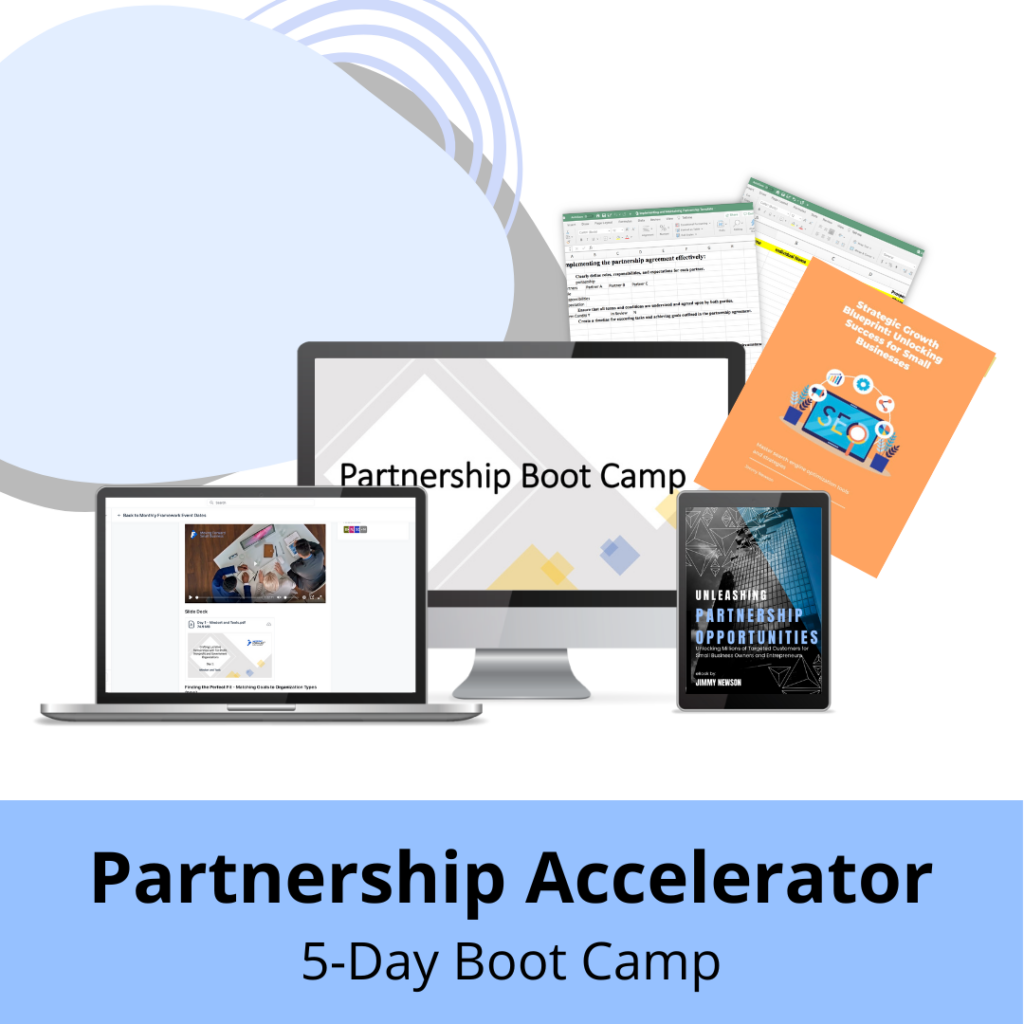Partnerships are essential for success, but knowing where to start can be challenging. Whether you’re looking to collaborate with other companies, influencers, or industry leaders, understanding how to find and build meaningful partnerships is key to increasing your reach and gaining an edge over the competition. In this blog post, we will explore the power of partnerships and provide tips for finding and building them for your business.
The Power of Partnerships and Why They Are Important
Partnerships are an essential part of any successful business. They can help you expand your reach, open up new opportunities, and provide resources you may not have access to. Partnerships can benefit both sides, allowing you to collaborate with another organization or person to increase your market share and generate more revenue.
Partnerships can help businesses grow faster than they would on their own. When two companies come together, they combine their resources and contacts to create a stronger force. This can lead to a larger customer base, improved product offerings, and an increase in profits. With the right partnerships, businesses can leverage each other’s strengths to gain a competitive edge in the market.
📅 PARTNERSHIP ACCELERATOR 5-DAY BOOTCAMP
Launches September 4th – September 8th – Cost: $20 non-members/Free for Pro Members
Partnerships also provide access to new markets, technology, and ideas. When two organizations join forces, they can pool their knowledge and skills to create something greater than they could have achieved alone. This could include expanding into a new region or launching a new product. By working together, both sides can benefit from each other’s experience and expertise.
Lastly, partnerships can create new relationships and strengthen existing ones. Working with other companies gives you the opportunity to form relationships with people who share similar values and goals. This helps to foster a sense of community and collaboration within the industry. By creating these relationships, you can open doors for future collaborations and collaborations with other industries.
Partnerships are a great way to grow your business and open up new opportunities. They allow you to leverage each other’s strengths and resources to gain a competitive edge in the market. With the right partnership, you can create something greater than what you could have achieved alone and gain access to new markets, technology, and ideas.
Partnerships vs. Relationships
When it comes to business, partnerships and relationships often get confused. They are similar in the sense that both involve trust and communication, but they have some key differences.
A partnership is a formal agreement between two or more parties that can be financial or non-financial. A partnership is based on the principles of collaboration, mutual respect, and shared goals. Each partner makes a commitment to invest in the venture and takes responsibility for its success or failure.
A relationship, on the other hand, is less formal. It usually involves some kind of personal connection, whether it’s with a customer, vendor, or collaborator. Relationships involve trust, communication, and loyalty, but the stakes may be lower than those in a partnership. For example, if you are working with a vendor who is providing products for your business, the relationship is focused on creating an environment of mutual trust and support.
The key difference between partnerships and relationships is that a partnership has a formal agreement with specific expectations of each partner. On the other hand, relationships involve more informal interactions with no formal agreement.
In conclusion, understanding the difference between partnerships and relationships is important when it comes to business. Knowing when to pursue a partnership and when to focus on building relationships can make a big difference in your success.
Classifying Your Relationships and Partnerships
Understanding the differences between relationships and partnerships is essential for businesses that want to make the most of both. Relationships are based on mutual trust, respect, and understanding. They can be used to build credibility and trust with others, while partnerships focus on both parties’ shared goals, resources, and mutual benefit.
Relationships can be classified into three main categories: customers, suppliers, and peers. Customers are people who purchase goods or services from your business. Suppliers provide goods or services to your business. Peers are businesses with a similar goal to yours and can provide value through collaboration.
Partnerships are more focused on the mutual benefit each partner provides and are often based on a shared vision. Partnerships can include financial investments, collaborative marketing efforts, or joint venture projects. When building strong partnerships, it’s important to ensure each partner adds value to the relationship. This means you need to clearly understand what your partners can offer and how their contribution will help your business reach its goals.
Classifying your relationships and partnerships into distinct categories will make it easier for you to identify potential areas for collaboration and collaboration opportunities. Identifying these types of relationships early on will help you make better decisions when it comes to forming partnerships in the future.
How to Find the Right Partners?
Finding the right partners for your business is an integral part of success. It’s essential to take your time and research to ensure you’re partnering with people with the same goals, values, and objectives as you.
One of the best ways to find the right partner is to use your existing network. Speak to other entrepreneurs and ask for recommendations. Networking can also be a great way to make connections with potential partners. Attend industry events or join online groups where you can meet other professionals in your field.
It’s also worth exploring online platforms like Fiverr, which allow you to search for freelancers and businesses in specific industries. You can view profiles, read reviews, and better understand the type of services each business provides.
Another great way to find potential partners is to look for complementary businesses. For example, if you own an online retail store, partnering with a dropshipping service provider might be beneficial. Or, if you’re a web designer, look for someone who specializes in SEO or copywriting.
Finally, don’t forget to look locally. Contact local businesses in your area and explore the possibility of working together. These types of partnerships can be incredibly beneficial as you will have a face-to-face relationship with your partner.
No matter which method you choose, make sure to do your due diligence when vetting potential partners. Ask questions about their experience, how they approach projects, and how they handle customer service issues. Research their background and customer reviews to ensure they fit your business correctly.
What Should You Include in Your Research Phase?
When researching potential partners, it’s important to take a deep dive into who they are and what they have to offer. Here are some questions to ask and points to consider when you’re conducting your research:
- What is the reputation of the potential partner?
- What are the terms of the partnership agreement?
- Is the potential partner financially stable?
- What is their customer service like?
- Are there any potential conflicts of interest between your companies?
- Are there any cultural differences that could cause issues?
- What type of experience do they have in the industry?
- What are the goals of the potential partner?
- Are there any risks associated with working with this partner?
- What type of resources do they have available for your business?
- Are there any other potential partners that could be beneficial to your business?
Answering these questions will help you determine whether or not a potential partner is a good fit for your business and can help you make a more informed decision about whether to move forward with the partnership.
Building a Partnership
Once you’ve identified potential partners and established a rapport, it’s time to move into the building phase of the partnership. It is important to be clear and organized when forming a partnership so that both parties are comfortable and understand what they are getting out of it.
When building a partnership, consider having a formal agreement in place. This ensures that each partner clearly understands their roles and responsibilities, as well as any financial terms. A partnership agreement should also include goals, a timeline, and details on how you will communicate and make decisions.
It is also important to plan for how you will measure success. Establishing key performance indicators (KPIs) will help you evaluate the success of your partnership over time and make any necessary changes if needed.
Finally, make sure that your partnership is flexible. No matter how well planned, partnerships often change over time as circumstances and goals evolve. Having an open and honest communication line with your partner can help you anticipate and address any issues that may arise.
What to Do If A Partnership Isn’t Working?
Partnerships can be a great way to expand your business and reach new customers, but what do you do when a partnership isn’t working?
First, it’s important to recognize that partnerships don’t always last forever. Sometimes, external factors can cause a partnership to dissolve or one party to become unhappy with the agreement. This is why it’s important to go into any partnership agreement with a clear understanding of what is expected from each side and when the partnership will end.
If you find yourself in a situation where your partnership isn’t working, you should first talk to your partner. Communication is key, and it’s best to try to work through any issues that may have arisen before taking more drastic measures.
If talking doesn’t help, it may be time to consider other options. You could try to renegotiate the terms of the partnership or even end it if necessary. Before doing this, ensure that all parties understand the decision and everyone is on the same page.
Finally, remember that taking a break from partnerships is okay if they aren’t working out. Partnerships are intended to be mutually beneficial relationships, so if yours isn’t functioning as it should, it might be best to wait and see how things develop before moving forward.
What Makes a Great Partnership?
- Clear and mutual goals – both partners should have common goals and objectives that are clear to each party.
- Transparency – both partners should be honest about what they can offer and what they expect from the other.
- Mutually beneficial – the partnership should provide benefits to both parties.
- Communication – effective communication is essential for a successful partnership.
- Trust – trust is key in any relationship, but especially in a business partnership.
- Respect – respect is essential to build and maintain a strong partnership over time.
- Flexibility – the ability to adjust to changing circumstances and pivot when needed is important.
- Shared values – partners should share core values to ensure the partnership’s success.
What Makes a Bad Partnership?
- Lack of Trust: If the partners lack trust, it is difficult to collaborate and build a productive partnership.
- Poor Communication: Without clear and effective communication, making progress and coming to an agreement can be challenging.
- Different Goals: When partners have different goals, it can lead to confusion and difficulty in reaching a consensus.
- Unclear Roles: Without knowing each other’s roles, expectations, and responsibilities, it can be difficult for a partnership to be successful.
- Unrealistic Expectations: If one partner has unrealistic expectations of the other, it can lead to disappointment and frustration.
- Financial Insecurity: If one partner doesn’t have enough money or resources to invest in the partnership, it can cause instability and insecurity.
- Poor Work Ethic: If one partner has a bad work ethic, it can lead to problems with productivity and output.
- Lack of Transparency: Without open and honest communication, moving forward with the partnership can be challenging.
- Disrespectful Behavior: Partners need to respect each other in order for a partnership to be successful. Any disrespectful behavior should be addressed quickly.
Need Help in Partnership Planning?
Join The Partnership Accelerator 5-Day Boot Camp, an immersive program specifically crafted for small business owners, entrepreneurs, and founders who want to give their businesses an extra push. Led by Jimmy Newson, an experienced speaker who has successfully leveraged strategic partnerships with multiple organizations, the boot camp offers a low cost of $20 for non-members and free to pro members to grant participants the opportunity to discover the benefits of partnership opportunities, potentially reaching millions of their potential customers. During the 5-day period starting on September 4, 2023, attendees will have access to actionable tips, templates, and real-life scenarios that can assist in establishing profitable partnerships. At the end of the boot camp, each individual will be armed with the resources needed to become an attractive partnership candidate and see their business reach new heights.
Conclusion
Partnerships can be a powerful tool to help your business grow and thrive. With the right partnerships, you can increase your reach, grow your customer base, and gain access to new opportunities. Finding and building the right partnerships for your business takes time and effort, but the rewards can be immense. By doing your research, finding and building relationships, and setting clear expectations, you can create mutually beneficial partnerships that will bring long-term success to your business.









I like that you pointed out how partnerships could be a powerful tool to help a business grow and thrive. I was listening to a video about a business class earlier and I heard about the value of building partnerships. According to what I’ve heard, it seems automated partner relationship management systems are being used now too, which sounds pretty interesting.
Thanks, Luke. I’ve come across Allbound and have downloaded a couple of their resources in the past.